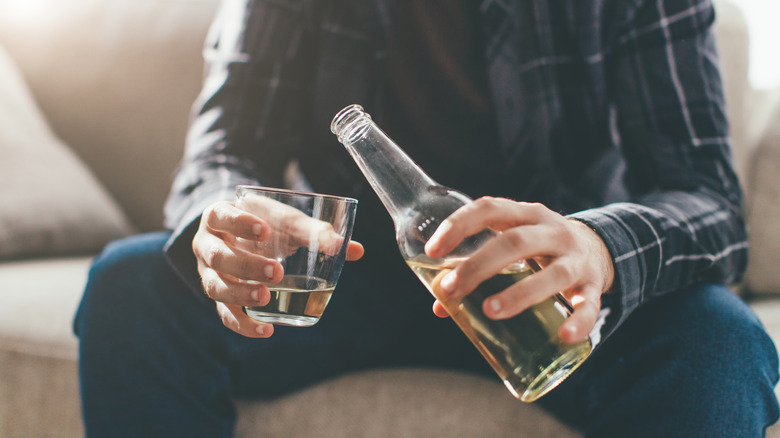Although people might joke that they have OCD about cleanliness or grammar, obsessive-compulsive disorder is a serious condition that can disrupt a person’s life. People with OCD can be plagued with frequent, intrusive thoughts about things like hygiene, perfection, or sex, according to the International OCD Foundation. A 2024 study in Biological Psychiatry found that the brain circuitry of someone with OCD works a little differently. Brain images of people with OCD showed that people with OCD get stuck in a loop; they know they should stop a certain behavior but can’t.
Specifically, people with OCD can’t effectively regulate serotonin levels because they have fewer serotonin receptors in the brain, according to NOCD. This poor transmission of serotonin is linked to OCD symptoms. People with OCD might turn to alcohol to suppress their symptoms; but alcohol can worsen symptoms of OCD, even if their OCD is well-managed.
Alcohol affects your brain by increasing serotonin levels, which gives you that feeling of euphoria. After a night of drinking, serotonin levels will drop lower than a person’s baseline. That’s why the next day people might feel depressed until serotonin levels return to baseline. Drinking alcohol with OCD might temporarily relieve OCD symptoms, but the symptoms can become more severe or more frequent when alcohol’s influence wears off. This could occur even if someone wasn’t experiencing OCD symptoms before drinking. If you have OCD and choose to drink alcohol, it’s wise to monitor how much alcohol affects your symptoms to keep them in check (via NOCD).
OCD can often occur with AUD and other conditions

Because alcohol could put a temporary pause on OCD symptoms, alcohol can easily become a form of self-medication for people with OCD, according to Alcohol Rehab Guide. Data indicates that about 24% of people with OCD could qualify for a diagnosis of alcohol use disorder (AUD). Even if alcohol serves as a coping mechanism for relationships or OCD, it’s best to treat both conditions together. Treating one condition separately could worsen the other condition, according to American Addiction Centers. Treating OCD and AUD could include a combination of cognitive behavioral therapy and medication. People with AUD might need an inpatient rehabilitation center to assist in safely withdrawing from alcohol while also managing OCD symptoms.
More than 90% of people who live with OCD also experience other mental health conditions, such as anxiety, depression, and bipolar disorders. Body dysmorphic disorder, hoarding disorder, trichotillomania, and other compulsive disorders are classified with OCD in the Diagnostic and Statistical Manual of Mental Disorders (DSM-5) and can coexist with OCD, according to Beyond OCD.
If you or anyone you know needs help with addiction issues, help is available. Visit the Substance Abuse and Mental Health Services Administration website or contact SAMHSA’s National Helpline at 1-800-662-HELP (4357).




